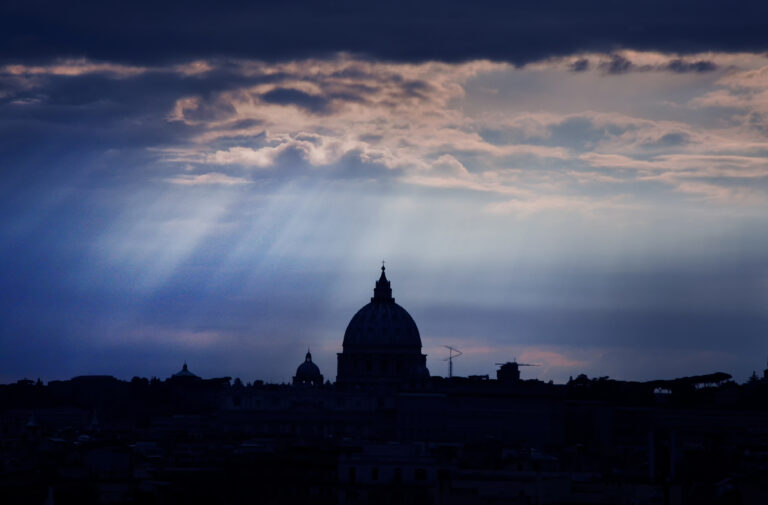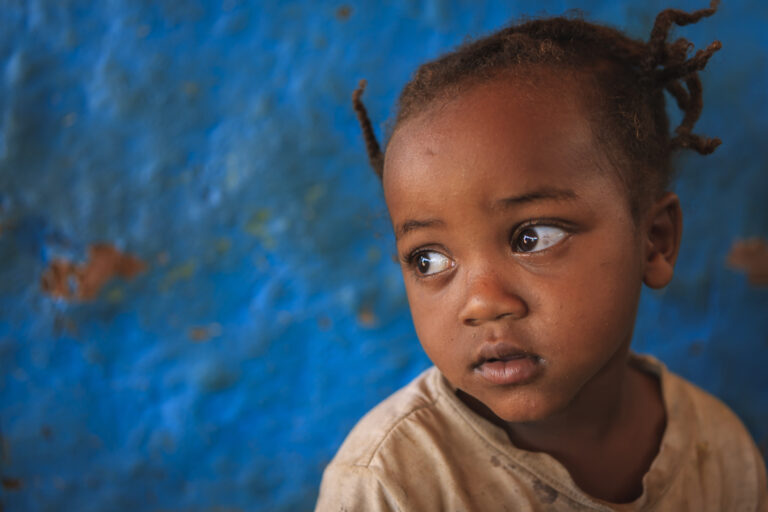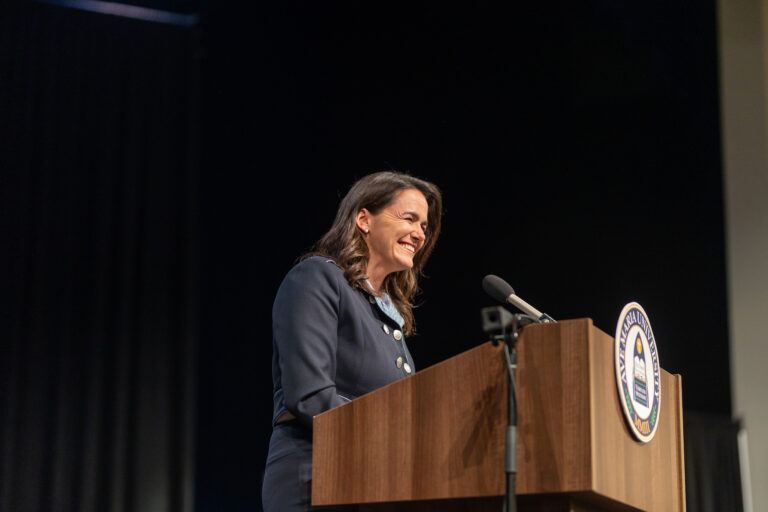12 January, 2007 Volume 9 / Number 2
The European Demographic Crisis and the Pope
At Christmas, Pope Benedict made extensive comments about Europe’s
demographic decline, raising our hopes that he will author an
encyclical on this most fundamental issue. As Shakespeare put it, "The world must
be peopled."
Many believe that the College of Cardinals chose Joseph Ratzinger as
Pope in a final effort to rescue Europe from the secularism, hedonism, and
anti-procreationism that threaten to obliterate it over the next few
decades. Cardinal Ratzinger even chose the name of St. Benedict, the
Father of Europe , as his papal name. Unless Pope Benedict XVI succeeds
in this task, which is an unlikely eventuality, the next Pope will
probably come from another continent and focus his energies elsewhere than on
the fast-dying Old World.
In the meantime, Pope Benedict has had much to say about the decadence
of the wellspring of Western Christendom. I believe that low birthrates
will become a more and more prominent part of the debate over Europe’s
future (or lack thereof), and an ever-more-acknowledged piece of evidence
damning the post-modern secularist project. On a few occasions in public fora,
the Pope has highlighted collapsing birthrates and explored their
meaning. Most recently and perhaps most extensively, he did so during his
annual Christmas speech to the Roman Curia on December 22.
The speech, given in the Clementine Hall of the Vatican, recapped
notable events of the year, including the Pope’s trip to Spain . “The visit
to Valencia, Spain , was under the banner of the theme of marriage and the
family,” said His Holiness. “It was beautiful to listen, before
the people assembled from all continents, to the testimonies of
couples–blessed by a numerous throng of children–who introduced
themselves to us and spoke of their respective journeys in the
Sacrament of Marriage and in their large families. They did not hide the fact
that they have also had difficult days, that they have had to pass through
periods of crisis. Yet, precisely through the effort of supporting one
another day by day, precisely through accepting one another ever anew
in the crucible of daily trials, living and suffering to the full their
initial ‘yes,’ precisely on this Gospel path of ‘losing
oneself,’ they had matured, rediscovered themselves and become happy.”
Benedict used the recollection of this experience to muse upon the
nature of Europe’s demographic crisis. Even the inflated statistics of the
United Nations Population Fund put Europe’s total fertility rate at a
fatal 1.4 and assert that Europe’s population is already shrinking.
“Before these families with their children, before these families in
which the generations hold hands and the future is present, the problem of
Europe , which it seems no longer wants to have children, penetrated my
soul. To foreigners this Europe seems to be tired, indeed, it seems to
be wishing to take its leave of history,” the Pope said, referencing the
suicidal impulse of that apostate continent. “Why are things like
this? This is the great question. The answers are undoubtedly very complex. . .
In mentioning these difficulties, perhaps the reasons also become
clearer why for many the risk of having children appears too great. A
child needs loving attention. This means that we must give children
some of our time, the time of our life. But precisely this "raw material"
of life—-time–seems to be ever scarcer. The time we have available
barely suffices for our own lives; how could we surrender it, give it to
someone else? To have time and to give time–this is for us a very concrete
way to learn to give oneself, to lose oneself in order to find oneself.”
In modern societies, organized around production—-economic
production, not the production of the next generation of human beings—-and infected
with the feminism that has led to two-income households as a necessity for
middle-class lifestyles, people haven’t the time for children. Could
many more deeply critical observations of modern life be made than this?
In addition, the Pope noted, adults no longer have a clear idea of how
to raise children. “In addition to this problem comes the difficult
calculation: What rules should we apply to ensure that the child
follows the right path and in so doing, how should we respect his or her
freedom?” he said. “The problem has also become very difficult because we are
no longer sure of the norms to transmit; because we no longer know what
the correct use of freedom is, what is the correct way to live, what is
morally correct and what instead is inadmissible. The modern spirit
has lost its bearings, and this lack of bearings prevents us from being
indicators of the right way to others.”
The Pope explained that the situation is even worse than this.
“Indeed, the problem goes even deeper,” he said. “Contemporary man is
insecure about the future. Is it permissible to send someone into this
uncertain future? In short, is it a good thing to be a person? This deep lack
of self assurance–plus the wish to have one’s whole life for oneself–is
perhaps the deepest reason why the risk of having children appears to
many to be almost unsustainable.”
When doubt whether it is “a good thing to be a person” becomes
widespread in a civilization, what can save it but a profound spiritual renewal?
Given the risible self-destruction of Europe’s moribund Protestant
churches, can any force other than the Catholic Church provide this
renewal for Europe? Or perhaps Europe’s fast-growing, high-fertility
Muslim population will provide its own spiritual reformation for the
continent.
“In fact, we can transmit life in a responsible way only if we are
able to pass on something more than mere biological life, and that is, a
meaning that prevails even in the crises of history to come and a certainty in
the hope that is stronger than the clouds that obscure the future,”
continued Benedict. “Unless we learn anew the foundations of life–unless we
discover in a new way the certainty of faith–it will be less and less
possible for us to entrust to others the gift of life and the task of
an unknown future. Connected with that, finally, is also the problem of
definitive decisions: Can man bind himself forever? Can he say a
‘yes’ for his whole life? Yes, he can. He was created for this. In this
very way, human freedom is brought about and thus the sacred context of
marriage is also created and enlarged, becoming a family and building
the future.” The Pope went on to criticize the conditional yeses blessed
by the state in civil unions for unmarried couples and to deplore the
anti-human nature of same-sex “marriage.”
Those in favor of sodomy have no respect for the human body, he said.
“Such theories hold that man–that is, his intellect and his
desire–would decide autonomously what he is or what he is not. In this, corporeity
is scorned, with the consequence that the human being, in seeking to be
emancipated from his body–from the ‘biological sphere’–ends by
destroying himself,” asserted Benedict. Looking at the undisputed
trends in the Western world, how can anyone disagree?
The Pope has made other, less extensive public references to declining
birthrates as well. To a group of Canadian bishops on their ad limina
visit May 20, he said, “Central to the cultural soul of the nation is
Christ’s immeasurable gift of faith which has been received and
celebrated over the centuries with deep rejoicing by the peoples of your land.
Like many countries, however, Canada is today suffering from the pervasive
effects of secularism. The attempt to promote a vision of humanity
apart from God’s transcendent order and indifferent to Christ’s beckoning
light, removes from the reach of ordinary men and women the experience of
genuine hope. One of the more dramatic symptoms of this mentality, clearly
evident in your own region, is the plummeting birthrate. This
disturbing testimony to uncertainty and fear, even if not always conscious, is in
stark contrast with the definitive experience of true love which by its
nature is marked by trust, seeks the good of the beloved, and looks to
the eternal.”
On Aug. 31, 2005, during a Wednesday public audience, the Pope said,
“The Psalmist extols in particular ‘the sons of youth’: The father who
has had sons in his youth will not only see them in their full vigor, but they
will be his support in old age. He will be able, therefore, to face
the future confidently, like a warrior, armed with a quiver of those
victorious pointed ‘arrows’ that are his sons. The purpose of this
image, taken from the culture of the time, is to celebrate the safety,
stability and strength found in a large family, such as is presented anew in the
subsequent Psalm 128, in which the portrait of a happy family is
sketched. The last picture shows a father surrounded by his sons, who is
welcomed with respect at the city gates, the seat of public life. Begetting is
thus a gift that brings life and well-being to society. We are aware
of this in our days in the face of nations that are deprived, by the
demographic loss, of the freshness and energy of a future embodied by
children.”
Birthrates are low not only in Europe and Canada , but in most of the
rest of the Christian world including Latin American nations and the United States . Our societies are aging rapidly. This disaster is so grave,
and its metaphysical roots so deep in the souls of Christian men and women,
that we can hope that the Pope will write an encyclical solely about
this crisis. Such an encyclical will raise this issue to the level of
importance and awareness that it deserves, and perhaps prompt a
solution before it is too late. And aren’t the low birthrates of every
Western nation proof of the wisdom of the Church’s teachings on secularism,
marriage, feminism, contraception, and abortion?
Islamic jihad and “global warming” are often presented as the most
dangerous threats to the Western world today, yet they pale in
comparison to the demographic crisis since, of course, without people, nothing
else matters. We can await such a papal document with hope.
Joseph A. D’Agostino is Vice President for Communications at the Population Research Institute.










